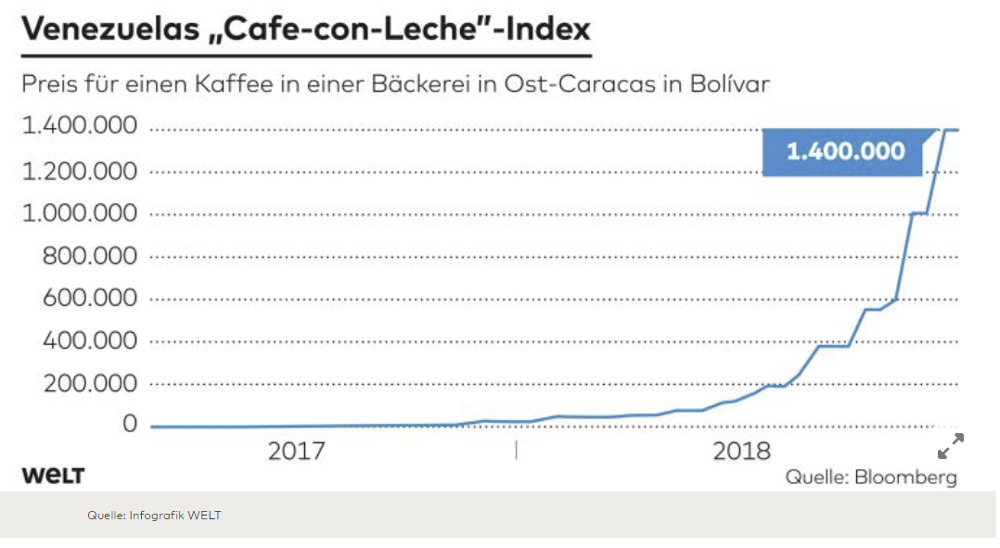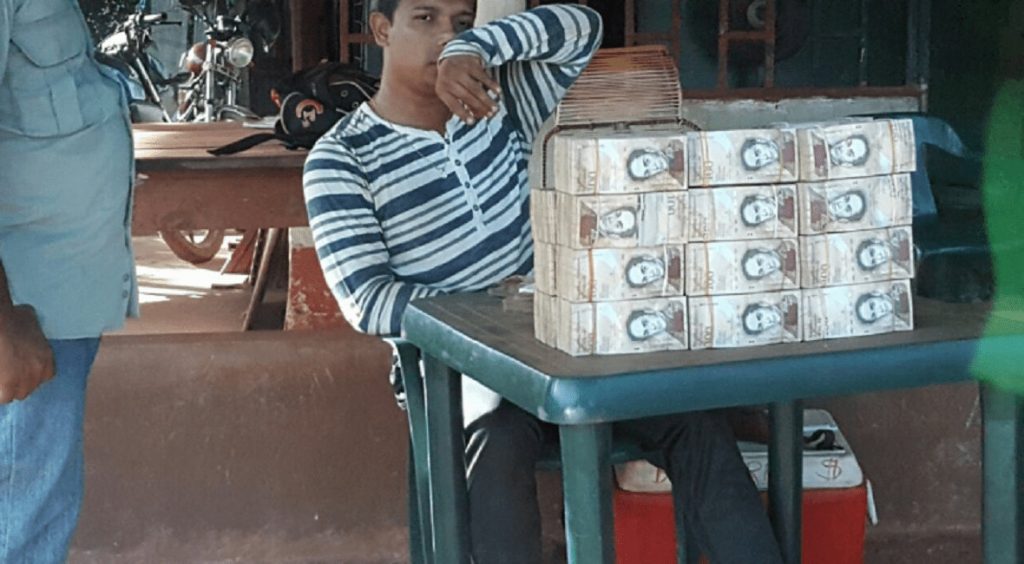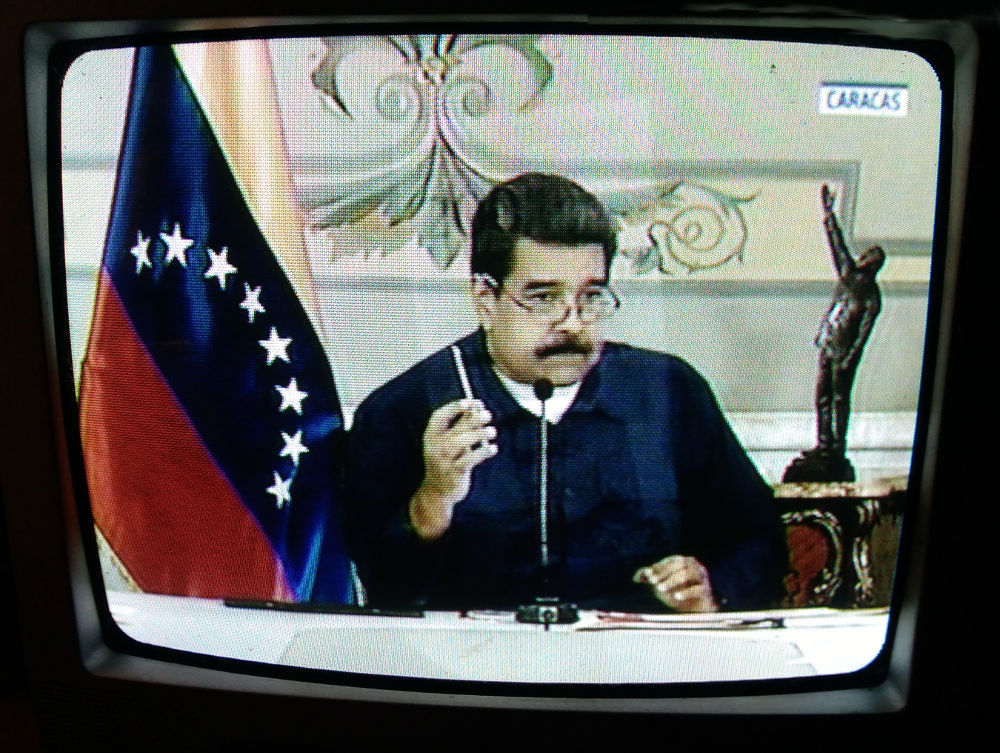CARACAS, Venezuela (ViaNews) - Venezuela's President, Nicolás Maduro, announced new economic policies this week. Venezuelans have long waited for measures which can provide relief to their difficult economic situation. People's faith in their government is being put to the test.
Venezuela today: A rich country with poor people
Suffering from an inflation rate, which the IMF expects to be over 1.000.000% for the end of this year, Venezuelans have been waiting for the light at the end of the tunnel. They have reelected President Nicolás Maduro for another 7 years this April 20, and he's expected to mitigate the ever deteriorating people´s economic situation, as promised during the presidential campaign.
In 2018, the prices of food, medicines, and parts have increased dramatically.
Mr. Maduro´s government has attributed blame to the U:S: economic blockade which is, according to him, part of the economic warfare designed to defeat the Bolivarian (socialist) Revolution.
The Venezuelan government has increased wages and retirement pensions in a little bit below the inflation rate, pushing new banknotes into circulation and increasing inflation.
The price of a coffee with milk (origin of Bloomberg´s “Café con Leche Index”) bought at the eastern (wealthier) part of Caracas, increased from near 200,000 bolivars in April to 1,400,000 bolivars last week and to 2,000.000 as off today.
[caption id="attachment_4852" align="aligncenter" width="1000"]

Venezuela's "Cafe con leche"[/caption]
Oppositionists consider this tremendous inflation a natural consequence of oil prices drop, the little economic know-how of President Maduro´s cabinet, and the unwillingness to apply the IMF measures that go against the currently used subsidizing policies.
The Venezuelan government points to the alleged economic warfare caused by enemies of the revolution operating from Colombia. They explain that this is the reason why cash in Venezuela is sold for 300% to 400% of its face value. This can be easily demonstrated when buying at any street market, where 30 eggs are sold for 6 million bolívars if paid with a debit card, but you can get them for 2 million when paying in cash.
This cash is then sent to the neighboring Colombia, where it can be legally converted into US dollars. In the attached video “Captured smugglers with bolivar bills,” the narrator explains that two smugglers were captured when transporting 1 billion bolivars (USD 285 at the black market price) in cash, which they were allegedly going to sell for four times its face value near the Colombian border.
[caption id="attachment_4853" align="aligncenter" width="696"]

Venezuelan's Bolivar banknotes in Colombia.[/caption]
Could this be Venezuelans shortcut to better economic conditions?
This Wednesday, July 25, President Maduro announced five new policies to be immediately implemented so to solve the harsh economic situation Venezuelans are now facing.
The announcement was nationally broadcasted live by radio and TV, one day after the President's return from a trip to Turkey and Cuba.
It was a rather different presidential live broadcast. There were no National Liberator Simón Bolivar´s or Bolivarian Revolution leader and former President, Hugo Chavez´s paintings decorating the set. The only primary colors were the yellow blue and red from the national flag, not very much highlighted. The President was dressed in navy blue with a white collar. No one was dressed in red, the usual revolutionary color. The word “socialism” was not pronounced. The President said several times “To the wise, few words suffice”.
[caption id="attachment_4850" align="aligncenter" width="1000"]

Nicolas Maduro speech on national TV. Photo by: Joseph Romeo.[/caption]
Nicolás Maduro made five announcements.
- 1- Next August 20th the actual Bolivar Fuerte will be converted to Bolivar Soberano, which will be worth 100.000 old Bolivar Fuertes. This new currency will be anchored to the Petro, the Venezuelan cryptocurrency which has been defined as the value of a Venezuelan oil barrel.
- 2- The actual law against foreign exchange criminal acts will be changed for a new law, decriminalizing certain foreign exchange acts, consistently with today´s announced new policies.
- 3- The proven oil reserves of the Ayacucho Block Number 2 consisting of almost 30 million oil barrels will be transferred to the Central Bank, to increase its reserves and to back up the emission of crypto-actives.
- 4- All tariffs and related custom taxes affecting capital goods and raw material imports will be abolished for the industry and agriculture.
- 5 A National Transport Census for all private and publicly owned vehicles will take place.
For the first time after 18 years of the Bolivarian Revolution, the President said last July 25, that the era of government-controlled foreign exchange and subsidized services and goods was near its end.
The government also expects that these announcements will increase investment in industrial and agricultural enterprises, by allowing the free convertibility of local currency to hard currencies for exporting gains and tax-free imports of machinery and raw materials. Almost free, today´s subsidized gasoline prices will be increased.
Oil industry privatization in the future?
Very critical to the Venezuelan government is Rafael Ramírez, the former Petróleos de Venezuela President, former late Hugo Chavez´s Oil Minister, and until a few months ago, Nicolás Maduro´s Ambassador to the United Nations. Mr. Ramirez published an article on Aporrea a long article
criticizing Maduro´s oil policies and the recent announcements.
Aporrea is a Venezuelan website publishing news and opinions according to the point of view of supporters of former President Hugo Chávez and the Bolivarian Revolution.
“Assigning oil field reserves to Central Bank violates the Constitution. This announcement means that Maduro is getting ready to privatize the Orinoco Oil Belt, issuing title deeds to be commercialized by financial speculators,” wrote Rafael Ramirez on Sunday, July 29.
Rafael Ramirez is presently considered an outlaw to both Venezuelan and U.S. government.
 Venezuela's "Cafe con leche"[/caption]
Oppositionists consider this tremendous inflation a natural consequence of oil prices drop, the little economic know-how of President Maduro´s cabinet, and the unwillingness to apply the IMF measures that go against the currently used subsidizing policies.
The Venezuelan government points to the alleged economic warfare caused by enemies of the revolution operating from Colombia. They explain that this is the reason why cash in Venezuela is sold for 300% to 400% of its face value. This can be easily demonstrated when buying at any street market, where 30 eggs are sold for 6 million bolívars if paid with a debit card, but you can get them for 2 million when paying in cash.
This cash is then sent to the neighboring Colombia, where it can be legally converted into US dollars. In the attached video “Captured smugglers with bolivar bills,” the narrator explains that two smugglers were captured when transporting 1 billion bolivars (USD 285 at the black market price) in cash, which they were allegedly going to sell for four times its face value near the Colombian border.
[caption id="attachment_4853" align="aligncenter" width="696"]
Venezuela's "Cafe con leche"[/caption]
Oppositionists consider this tremendous inflation a natural consequence of oil prices drop, the little economic know-how of President Maduro´s cabinet, and the unwillingness to apply the IMF measures that go against the currently used subsidizing policies.
The Venezuelan government points to the alleged economic warfare caused by enemies of the revolution operating from Colombia. They explain that this is the reason why cash in Venezuela is sold for 300% to 400% of its face value. This can be easily demonstrated when buying at any street market, where 30 eggs are sold for 6 million bolívars if paid with a debit card, but you can get them for 2 million when paying in cash.
This cash is then sent to the neighboring Colombia, where it can be legally converted into US dollars. In the attached video “Captured smugglers with bolivar bills,” the narrator explains that two smugglers were captured when transporting 1 billion bolivars (USD 285 at the black market price) in cash, which they were allegedly going to sell for four times its face value near the Colombian border.
[caption id="attachment_4853" align="aligncenter" width="696"] Venezuelan's Bolivar banknotes in Colombia.[/caption]
Venezuelan's Bolivar banknotes in Colombia.[/caption]
 Nicolas Maduro speech on national TV. Photo by: Joseph Romeo.[/caption]
Nicolás Maduro made five announcements.
Nicolas Maduro speech on national TV. Photo by: Joseph Romeo.[/caption]
Nicolás Maduro made five announcements.

